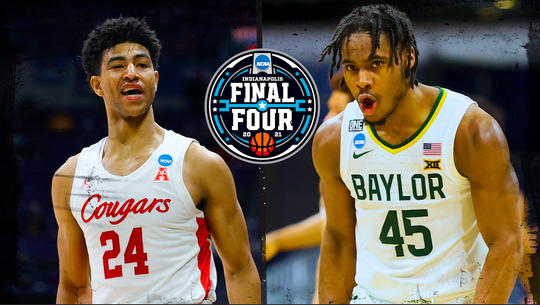NCAA Tournament men’s Final Four preview: No. 1 Baylor vs. No. 2 Houston – which team has the edge?
The Final Four matchup on the right side of the men's NCAA Tournament bracket is set.
No. 1 Baylor will take on No. 2 Houston on Saturday in Indianapolis.
Following a wild first two weekends of March Madness with no shortage of bracket-busting upsets, now the smoke has cleared from the first night of the Elite Eight and we have two teams ready to square it off – with a spot in the national championship on the line.
The Bears (26-2) are back in the Final Four for the first time since 1950, while the Cougars (28-3) are returning to college basketball's final weekend for the first time since 1984 during the Phi Slama Jama era. Baylor coach Scott Drew is in his first ever Final Four, while Houston coach Kelvin Sampson is returning there on a redemptive path.
Houston and Baylor will meet in the Final Four. (Photo: USA TODAY Sports)
Which team has the edge? USA TODAY Sports examines the matchup:
► How Baylor has the edge. The Bears have college basketball's most potent backcourt behind Jared Butler, MaCio Teague and Davion Mitchell – averaging a combined 46.4 points per game. The trio blend well together and bail each other out if one is having an off game. They help Baylor lead the nation in three-point shooting field goal percentage (41%) and make the team rank third in KenPom offensive efficiency. Butler is a first-team All-American who hasn't played his best basketball in this NCAA Tournament, but has takeover abilities as the program's go-to scorer for the past two seasons.
► How Houston has the edge: The Cougars are arguably the best defense remaining in March Madness, leading the nation in field goal percentage defense and limiting opponents to 57 points per game. They've contained opponents in this NCAA Tournament to an average of 55.7 points per game. Coach Kelvin Sampson's teams at Oklahoma had this same type of out-tough-the-opponent DNA, and expect Houston to make it difficult for Baylor's guards to get going from deep when they're smothering them on the perimeter. The Cougars do little things if they're not connecting from three-point range to keep the momentum in their favor, including offensive rebounding for second chance points.
► Key player for the Bears: Mitchell. Even though Teague can carve through defenses and Butler can score in a variety of ways, it's Mitchell who is the central part of the three-headed backcourt attack and coach Drew's offensive arsenal. That's because Mitchell is Baylor's backbone, playing with an aggressiveness and tenacity that is contagious to his teammates, while creating for them with 5.3 assists per game. Whether it's taking his man off the dribble and getting to the rack or draining a clutch jumper, Mitchell's play – and subsequent emotional reactions – breathes life into the Bears to swing the game's momentum in their favor.
► Key player for the Cougars: DeJon Jarreau. The American Athletic Conference defensive player of the year has been one of the best defensive stoppers in this NCAA Tournament, playing a big part in Houston limiting Syracuse's Buddy Boeheim in the Sweet 16 and Oregon State's Ethan Thompson in the Elite Eight. The 6-5 senior guard will guard the opponent's best player, and for Baylor it will just depend on which of its three guards is hot at the time. While the Cougars have their key offensive weapons (Quentin Grimes and Marcus Sasser), it's Jarreau's dive-on-the-floor hustle and turnover-forcing defense that injects energy into this squad.
Which team reaches the title game? Baylor 73-62. Not many teams score over 60 points on Houston, but the Bears have the offensive firepower to do it. The thing about Baylor's guards is that they operate great in a halfcourt set just as well as in transition. Houston is used to slowing teams down with a tempo-controlling defense, but ultimately, the Bears are used to that from great competition in Big 12 play. Baylor's faced 12 top-30 NET-ranked teams since January, compared to Houston's two. That battle-tested-ness will show.
Follow college basketball reporter Scott Gleeson on Twitter @ScottMGleeson.
Source: Read Full Article

